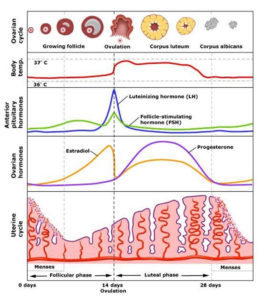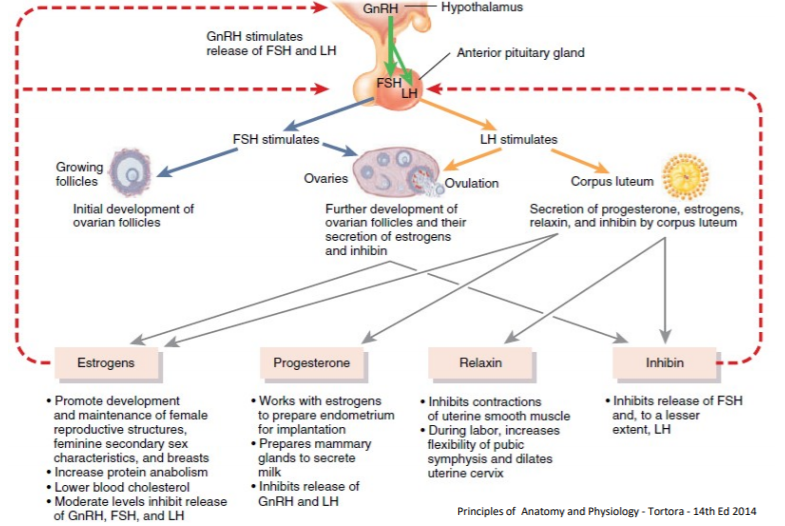 Strictly speaking, our bodies are incredibly clever vessels (especially women’s, if we may say so ourselves?). From digestion to creating hormones, to brain function and creating new life, it is one of the most complex ecosystems, supercomputers, crazy scientists, in the world. Yet despite this, things still go wrong.
Strictly speaking, our bodies are incredibly clever vessels (especially women’s, if we may say so ourselves?). From digestion to creating hormones, to brain function and creating new life, it is one of the most complex ecosystems, supercomputers, crazy scientists, in the world. Yet despite this, things still go wrong.
The average woman’s cycle goes for 28 days, this much is – common knowledge. Slight variations of this are not uncommon of course, but when it gets to the extremes of less than 21 days or over 35 days, this is when our cycle starts to become indicative of something else.
We do have a series of blogs that explain what goes on in each stage of our cycle, but as a quick recap, the cycle is split into the follicular and the luteal phase.
Day 1 is the first day of your period and it also marks the beginning of the follicular stage. In this time, the ovaries are getting ready to release an egg, and the follicular stage tends to last for about 12-25 days. Ovulation occurs usually on day 14 and marks the transition to the luteal phase. This can last another 10-16 days, but it is usually more like 12-14. When the luteal phase ends, the next cycle begins.
 When put that way, it seems like a relatively simple concept, but with so many modern-day stressors, our cycle can readily become altered. But what does this mean for our bodies? Our bodies tell us a lot, and once we know what irregular cycles indicate, we can go about fixing them. We do have a blog talking about how to fix long and short cycles, but first, find out what your cycle tells you about the inner workings of your hormones and ovaries, and what that may mean for you.
When put that way, it seems like a relatively simple concept, but with so many modern-day stressors, our cycle can readily become altered. But what does this mean for our bodies? Our bodies tell us a lot, and once we know what irregular cycles indicate, we can go about fixing them. We do have a blog talking about how to fix long and short cycles, but first, find out what your cycle tells you about the inner workings of your hormones and ovaries, and what that may mean for you.
We’ve divided the rest of this blog into two sections:
- What Our Cycles Tell Us About Our Fertility
- The Implications Of Varying Phases Of Your Cycle
Our hope is that by reading through both sections you’ll be closer to understanding what your body may be trying to tell you.
What Our Cycles Tell Us About Our Fertility
Normal menstrual cycle: A normal cycle lasts 26-31 days. If this is you, it generally indicates that as it is regular, there is regular ovulation and that all sex hormones are balanced to support natural conception.
Short menstrual cycle: Lasts less than 21 days. This tends to indicate that ovulation may not have occurred or has occurred earlier than normal. What this could mean for you is a few things. It could be that the ovaries contain fewer eggs and that menopause is approaching. This happens because as the number of eggs in the ovaries decreases, the brain creates more Follicle-Stimulating Hormone (FSH) to stimulate the ovaries to develop a follicle. This results in the follicle developing earlier and therefore, a shorter cycle. Doctors can check hormone levels, so if FSH is really high, that’s a sign the eggs are decreasing.
Sometimes, bleeding can occur without ovulation taking place in that cycle, like what happens on the birth control pill, this may appear as shortened cycles and if this is the case, natural conception will prove difficult. This is how the pill is an effective contraceptive, but when it occurs without chemical interference, having withdrawal bleeds without ovulation, this is not a good sign for straight forward fertilisation.
Long or irregular menstrual cycle: These are cycles that last longer than 35 days and can also indicate that ovulation is not occurring or occurring irregularly, making conception more difficult. This can be caused by a lack of regular ovulation and has a lot to do with the hormones which a regular cycle relies on. Typically, a fall in the hormone progesterone brings about bleeding, however, if a follicle does not mature and ovulate, progesterone is never released, and the lining of the uterus continues to build in response to oestrogen. Eventually, when the lining gets too thick and becomes unstable, like stacking a tower of blocks too high, it falls and thus starts the bleeding. This can result in the bleeding being very unpredictable, heavy, and long-lasting.
Being overweight or obese can also lead to heavy periods. Dr Kecia Gaither, a double board-certified physician in OB/GYN and maternal foetal medicine at St. Luke’s Medical Center in Kansas City explains that “You’re producing oestrogen from two venues — ovaries and the extra fat. Body fat has the capability to produce a lot of oestrogen, and all of this oestrogen in the uterus could lead to uterine cancer.”
 So, What If You Never Menstruate at All?
So, What If You Never Menstruate at All?
If this is the case, it would be fair to say that, unless you are already pregnant, you probably aren’t ovulating. Either that, or there is something restricting blood flow, which will decrease the chance of conceiving without intervention.
This can be caused by hormone imbalances as well, but it is commonly seen in people severely underweight, or their body is under a lot of stress and pressure. Returning to a regular cycle requires regaining some body fat and creating balance back into your life. Weight and stress aren’t everything however, and if you have never experienced a period, this could be due to a problem in the development of your uterus which an ultrasound would identify. If you have menstruated before and your cycle has stopped, it could be due to premature menstruation as mentioned earlier, which can make conceiving less likely. Any scar tissue inside the cavity must be removed so it does not affect implantation.
 When Bleeding Lasts More Than 7 Days
When Bleeding Lasts More Than 7 Days
This can also indicate that ovulation has not occurred or not occurring properly, there may also be something disrupting the lining of the uterus or a problem in forming blood clots. Prolonged bleeding, irregular bleeding and intermenstrual bleeding can also be caused by several things, these can include polyps, fibroids, cancer or infection in the uterus or cervix. In these cases, implantation of an embryo may be compromised and can hinder the chance of pregnancy and increase the risk of miscarriage.
As far as long and short cycles go, if this happens, there would be an effect on the length of one or both follicular and luteal phases. Sometimes, especially if you have irregular periods and are trying to conceive, it is important to get to the root of the cause, and as soon as you can, before the stress and disappointment of not being able to conceive hinders things further.
So, what if you’re not ovulating?
If you are suspicious that your ovaries are not ovulating, there can be many causes. Some of these include irregularities with the thyroid gland or elevations of the hormone prolactin that can disrupt the brain’s communication with the ovaries and result in anovulation (when ovaries do not regularly release mature eggs).
It can also be brought on by PCOS, which is caused by imbalanced sex hormones. With these imbalances, not only does it make it harder to get pregnant and ovulate in the first place, but it can increase the risk of miscarrying if you do become pregnant. Whether trying to conceive or not, if your body is not ovulating, your body is not functioning correctly, and getting tested could make sure you make the necessary life changes to live optimally.
 The Implications Of Varying Phases Of Your Cycle
The Implications Of Varying Phases Of Your Cycle
The phases of our cycle and the steps within each is essential for making sure our fertility is working well. Any drastic changes in these phases can lead to some of the aforementioned conditions and not just problems with fertility. In terms of the phases of the cycle, there is a science behind the irregularities in terms of your fertility, here is what each discrepancy may mean:
Short follicular phase: if you ovulate on day 10 or earlier of your cycle, it can be an indication that you released an immature egg. In this case, the egg is usually unable to be fertilized, but if it is, tends to have chromosomal issues.
Long follicular phase: if your follicular phase lasts more than 25 days, it is a sign that your body is making multiple attempts to ovulate. To notice if this is what is happening for you, there would be indicators of multiple patches of fertile cervical mucus, usually about 2 weeks apart as your oestrogen and luteinizing hormone (LH) levels rise again.
This tends to occur in cases of PCOS but can also occur in periods of high stress including intense exercise, travel and jet lag that tend to be overlooked as stress factors but can have a major effect on ovulation and follicular phase delay. The good thing is that a delayed ovulation shouldn’t have much of an effect on your fertility and ability to conceive, if ovulation occurs and you gave a healthy egg, you have just a good chance of conceiving as if you ovulated on time.
 Short luteal phase: if your luteal phase is less than 10 days, so you get your period less than 10 days after ovulating, it is a sign that your progesterone levels are too low. Progesterone basically helps maintain the uterine lining, and thus a short luteal phase can hinder the ability of the egg to implant, making it difficult to conceive.
Short luteal phase: if your luteal phase is less than 10 days, so you get your period less than 10 days after ovulating, it is a sign that your progesterone levels are too low. Progesterone basically helps maintain the uterine lining, and thus a short luteal phase can hinder the ability of the egg to implant, making it difficult to conceive.
A long luteal phase: on the other hand, if the luteal phase is longer than 16 days, you may want to take a pregnancy test! If this is negative, perhaps go to the doctors for a blood test, sometimes urine tests do not indicate pregnancy for several weeks.
We have another blog in this cycle titled How to Fix Your Long and Short Cycles, and Coming Off the Birth Control Pill which offers further information on this topic. There are also many wonderful practitioners who can help you determine if your cycle and hormones are out of balance. We’d recommend a Chinese Medicine practitioner who specializes in women’s health and fertility.
References:
1. Beall S, Shady Grove Fertility. What Does Your Menstrual Cycle Say About Your Fertility? [Internet]. Shady Grove Fertility Blog. 2019 [cited 17 August 2020]. Available from https://www.shadygrovefertility.com/blog/fertility-health/what-does-your-menstrual-cycle-say-about-your-fertility/
2. Meisel L. What Your Cycle Length Says About Your Fertility [Internet]. Ava. 2017 [cited 17 August 2020]. Available from: https://www.avawomen.com/avaworld/what-your-cycle-length-says-about-your-fertility/
3. Boutot M. Stress and The Menstrual Cycle [Internet]. Helloclue.com. 2016 [cited 22 July 2020]. Available from: https://helloclue.com/articles/cycle-a-z/stress-your-period
4. Hormonal Mastery with Dr. Andrea Huddleston. Online course.
5. What Your Menstrual Cycle Says About Your Fertility; Tracking Duration Can Help Women Trying To Get Pregnant. https://www.medicaldaily.com/menstrual-cycle-fertility-window-trying-get-pregnant-391898
6. Barrett KE, et al. Reproductive development & function of the female reproductive system. In: Ganong’s Review of Medical Physiology. 26th ed. New York, N.Y.: McGraw-Hill Education; 2019. https://accessmedicine.mhmedical.com. Accessed March 22, 2019.
7. Hammer GD, et al. Disorders of the female reproductive tract. In: Pathophysiology of Disease: An Introduction to Clinical Medicine. 8th ed. New York, N.Y.: McGraw-Hill Education; 2019. https://accessmedicine.mhmedical.com. Accessed March 22, 2019.






